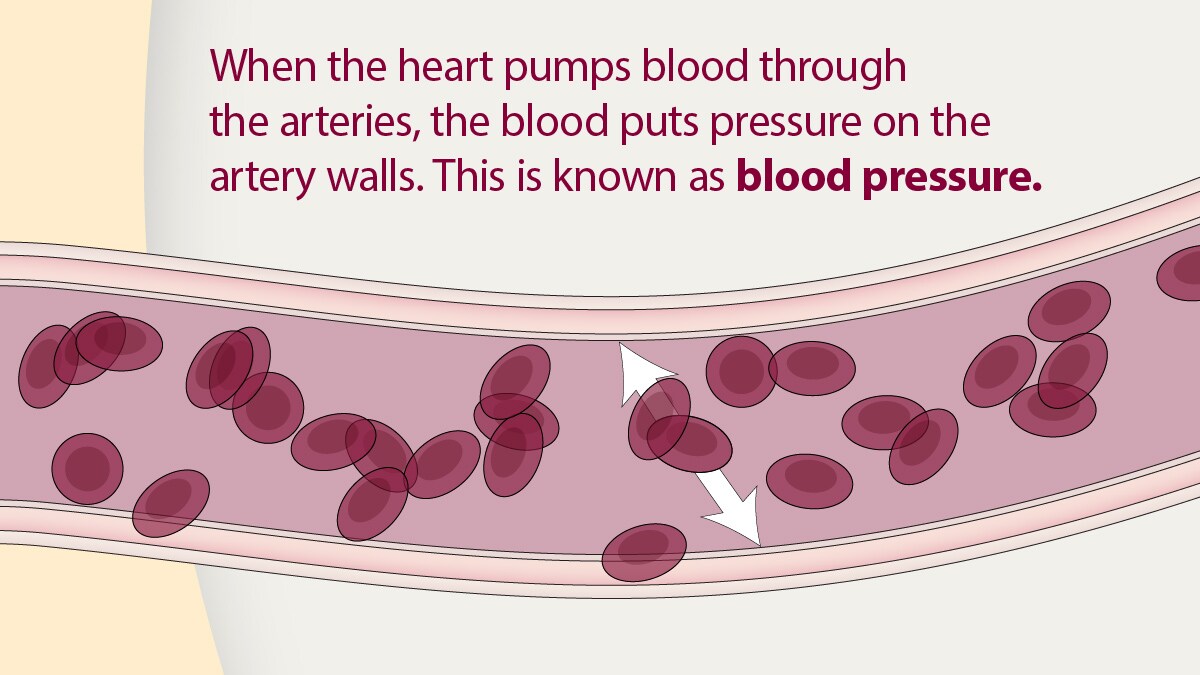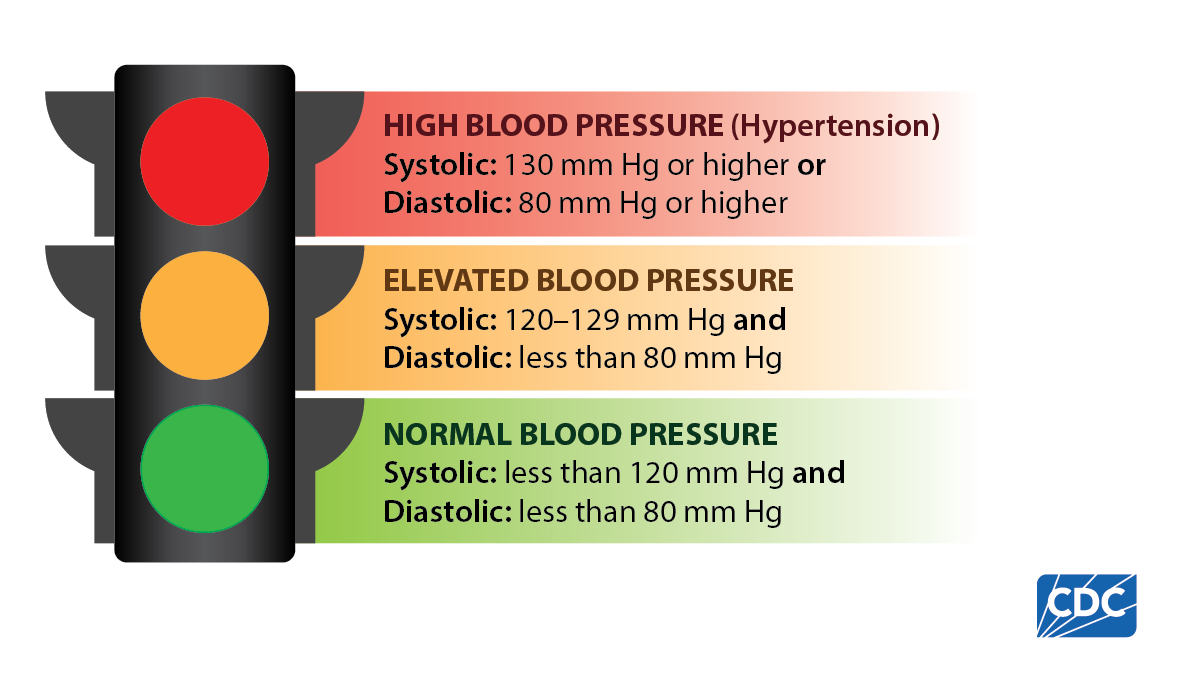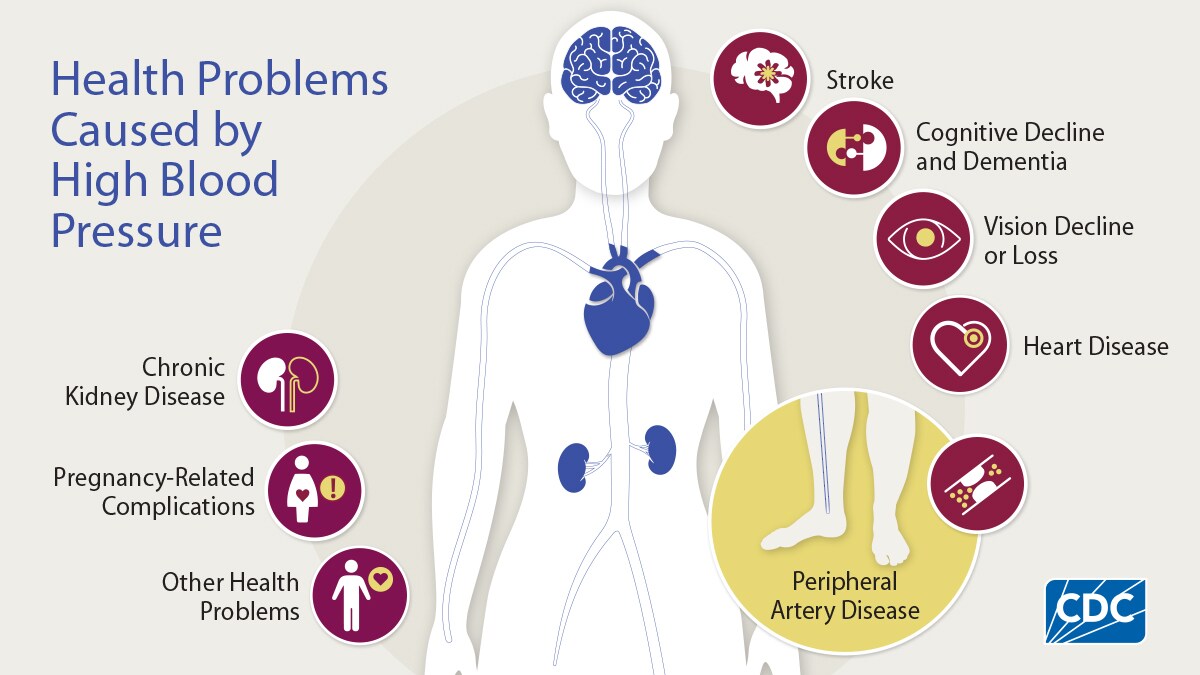Key points
- High blood pressure (hypertension) is consistently at or above 130/80 mm Hg.
- High blood pressure typically has no signs or symptoms but can cause problems for your heart, brain, kidneys, and eyes.
- No matter your age, you can take steps each day to keep your blood pressure in a healthy range.
- Some people may be able to control their blood pressure by making lifestyle changes or taking blood pressure medicines.
Definition of high blood pressure
Blood pressure is the pressure that occurs when blood pushes against the walls of your arteries. Arteries carry blood from your heart to other parts of your body.
Normal blood pressure is less than 120/80 mm Hg.1
High blood pressure, also called hypertension, is blood pressure that is higher than normal.
High blood pressure is consistently at or above 130/80 mm Hg.1
Your blood pressure changes throughout the day based on your activities. Having blood pressure consistently above normal may result in a diagnosis of high blood pressure.
The higher your blood pressure levels, the more risk you have for other health problems, such as heart disease, heart attack, and stroke.
Learn about how you can prevent and treat high blood pressure during pregnancy, which can put you and your baby at risk for health problems.

Diagnosis
Your health care team can diagnose high blood pressure. They can also make treatment decisions by reviewing your systolic (first number) and diastolic (second number) blood pressure levels and comparing them to guidelines.
Most health care professionals will use these guidelines from the ACC and AHA to diagnose high blood pressure:1

If a health care professional diagnoses you with high blood pressure, talk with your health care team about your blood pressure levels and how they affect your treatment plan.
Learn how and where to measure your blood pressure and why it's important to know your numbers.
Signs and symptoms
High blood pressure usually has no warning signs or symptoms, and many people do not know they have it. Measuring your blood pressure is the only way to know whether you have high blood pressure.
Causes
There are several causes of and risk factors for high blood pressure. Fortunately, you can control many of them.
High blood pressure usually develops over time. It can occur because of unhealthy lifestyle choices, such as not getting enough regular physical activity.
Certain health conditions, such as diabetes and obesity, can also increase the risk for developing high blood pressure. And high blood pressure can occur during pregnancy.
People who have depression, anxiety, stress, or post-traumatic stress disorder over a long period of time may develop other health problems, including an increased heart rate and high blood pressure.
Other risk factors, such as family history and the environment, can also increase a person's risk for high blood pressure.
Potential problems having high blood pressure could cause
High blood pressure can damage your health in many ways. It can seriously hurt important organs like your heart, brain, kidneys, and eyes.
The good news is that, in most cases, you can manage your blood pressure to lower your risk for serious health problems.

- High blood pressure (hypertension) complications can damage your health in many ways, including harming organs such as your heart, brain, and kidneys.
Heart attack and heart disease
High blood pressure can damage your arteries by making them less elastic. This decreases the flow of blood and oxygen to your heart and leads to heart disease. In addition, decreased blood flow to the heart can cause:
- Chest pain, also called angina.
- Heart attack, which happens when the blood supply to your heart is blocked and heart muscle begins to die without enough oxygen. The longer the blood flow is blocked, the greater the damage to the heart.
- Heart failure, a condition that means your heart can't pump enough blood and oxygen to your other organs.
Stroke and brain problems
High blood pressure can cause the arteries that supply blood and oxygen to the brain to burst or be blocked, causing a stroke. Brain cells die during a stroke because they do not get enough oxygen. Stroke can cause serious disabilities in speech, movement, and other basic activities. A stroke can cause death.
Having high blood pressure, especially in midlife, is linked to having poorer cognitive function and dementia later in life. Learn more about the link between high blood pressure and dementia from the National Institutes of Health's Mind Your Risks® campaign.
Heart valve disease
High blood pressure can cause heart valve disease, which is when any valve in the heart is damaged or diseased.
Kidney disease
Adults with diabetes, high blood pressure, or both have a higher risk of developing chronic kidney disease than those without these conditions.
Prevention
No matter your age, you can take steps each day to keep your blood pressure in a healthy range.
Many people with high blood pressure can lower their blood pressure into a healthy range or keep their numbers in a healthy range by making lifestyle changes. Talk with your health care team about:
- Physical activity each week (about 30 minutes a day, 5 days a week)
- Not smoking
- Eating a healthy diet, including limiting sodium (salt) and alcohol
- Keeping a healthy weight
- Managing stress
In addition to making positive lifestyle changes, some people with high blood pressure need to take medicine to manage their blood pressure.
Talk with your health care team right away if:
- You think you have high blood pressure.
- If you've been told you have high blood pressure but do not have it under control.
By taking action to lower your blood pressure, you can help protect yourself against heart disease and stroke, also called cardiovascular disease (CVD).
- Whelton PK, Carey RM, Aronow, WS, et al. 2017 ACC/AHA/AAPA/ABC/ACPM/AGS/APhA/ASH/ASPC/NMA/PCNA guideline for the prevention, detection, evaluation, and management of high blood pressure in adults: a report of the American College of Cardiology/American Heart Association Task Force on Clinical Practice Guidelines. J Am Coll Cardiol. 2018;71(19):e127–e248.